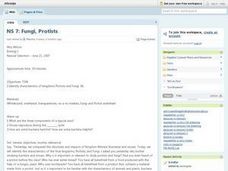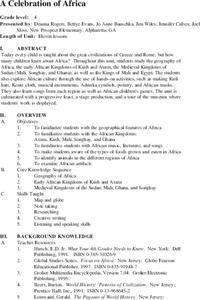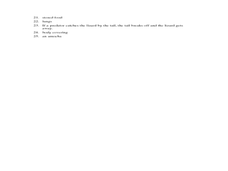Curated OER
Scientific Classification
In this scientific classification worksheet, students read about classification and the questions scientists ask in order to classify, then read about features of different classifications of animals. Worksheet is informational, no...
Curated OER
Invertebrates
Students identify the characteristics common to all animals. In groups, they compare the characteristics between the animals and how they are divided. To end the lesson, they compare the eight phyla of invertebrates and review the...
Curated OER
Dissect with Respect
Students, through exercises and discussions, examine ethics involved in the process of choosing and using laboratory animals, respect for the animal they dissect and how to behave in an ethical manner as they dissect various lab specimens.
Curated OER
Problems in Pollutia
Fifth graders, in groups, pretend as if they live in the imaginary kingdom called Pollutia. They make recommendations about environmental issues and give short speechs on how each problem should be solved.
Curated OER
Bible Activities
In this religious worksheet, students complete various activities related to the Bible. For example, students color in an illustration from the Bible and solve a related crossword puzzle. Students also match animals to their homes in a...
Curated OER
How Do Scientists Classify Organisms?
In this classification worksheet, students write in examples of the 6 kingdoms: archaebacteria, eubacteria, protists, fungi, plants, and animals. This worksheet is a graphic organizer.
Curated OER
Explorations Through Time
In this earth history worksheet, learners visit a website and complete 15 fill in the blank and 8 short answer questions based on what they read. Topics include biodiversity, animal kingdoms, evolution, fossils, and extinction.
Curated OER
Bound for Britain
Students discover the great immigration to the United Kingdom by examining historic photographs. In this world history lesson, students research the migration of West Indians to England in the early 1950's. Students read transcripts of...
Curated OER
Land Plants and Algae
Students compare and contrast algae and land plants. In this plant lesson students discover what algae and land plants require for growth. The students discuss experimental design. The students experiment with different treatments of...
Curated OER
Taxonomy
In this biology worksheet, students complete a crossword puzzle with 39 questions on taxonomy. They identify the different classification systems used in biology.
Curated OER
The Three Worm Phyla
Ninth graders examine the three worm phyla. In this classification instructional activity, 9th graders observe, compare and contrast the planarian, tapeworm, and fluke.
Curated OER
NS 7 Fungi , Protists
Students identify characteristics of kingdoms Protista and Fungi. They complete a worksheet of protists and fungi. Students review the familiar characteristics of plants, animals, bacteria and viruses. They need to familiarize...
Curated OER
Bison Calculations
Learners discuss how animals are cared for when they are captured. Using calculations, they determine how much food and water it takes for one bison and compare their water intake to humans. They also compare their weight to that of a...
Virginia Department of Education
Prokaryotes
Lead your biology class on a cell-sized adventure! Emerging scientists construct models of prokaryotes, then design an experiment to properly grow a bacterial culture. They conclude the activity by viewing the culture under a microscope....
Virginia Department of Education
Cell Parts
What do a bird, an egg, a rabbit, and a toad all have in common? This fun-filled resource explains the similarities and differences between cells and how all cells are similar, yet all are different. Learners begin by depicting a...
Curated OER
A Celebration of Africa
Students investigate early African civilizations. They create Kufi hats, musical instruments, pottery and African masks, sing songs, play African studenT games, and participate in a feast and tour of a museum where their artwork is...
Cornell University
Classification
Explore the scientific method of classification. An interactive activity asks learners to create a classification system for a group of objects and develop a flow chart to communicate their systems. In addition, individuals use a...
University of Southern California
What Lives In The Ocean?
One of the most diverse environments on Earth is the ocean. Young scientists explore the living things found in the ocean during an exciting seven-lesson unit. Their study includes organisms from plankton to invertebrates and vertebrates...
Curated OER
Folktale Writing
Review literary analysis techniques with this reading lesson about folktale writing. Middle schoolers read different folktales from many authors, and write their own folktales to share with the class. They identify the plot, morals and...
Curated OER
From Curiosity Cabinet to Museum Collection
Students study binomial nomenclature and museum-based research. They create a curiosity box, label the objects in their curiosity box , develop a classification scheme for the objects, and create a database of all objects collected by...
Curated OER
Fifth Grade Science Assessment
In this science assessment worksheet, learners complete a 25 question multiple choice quiz about biology. Plant and animal anatomy is included.
Curated OER
Introductory Bacteria and Virus Worksheet
Compare and contrast eukaryotes, prokaryotes, and viruses with a chart and a Venn diagram. Beginning microbiologists consider motility, reproductive ability, DNA content, and the presence of organelles. They write short answers to...
Curated OER
All About Seeds!
How do fruits relate to flowers and seeds? Identify the seeds and their purpose with a coloring activity for kindergartners. Once they color the seeds of apples, bananas, and peas (among others), kids get hands-on experience with bean...
National Nanotechnology Infrastructure Network
Biology Reference Sheet
First year life science or biology pupils will appreciate this all-inclusive reference page. It provides a diagram of both a plant and an animal cell, the metric system prefixes, classification levels, definitions for cell processes, the...

























